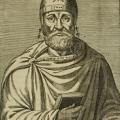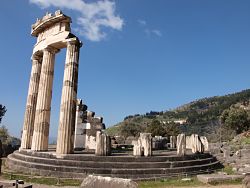80 - Delphic Utterances: Plutarch
Plutarch, a major figure of early Imperial literature, was also a Platonist philosopher. He gives us insight into Platonism before Plotinus, and also the letter E.
Themes:
For primary texts see the Loeb editions of Plutarch’s Moralia from Harvard University Press.
• F.E. Brenk, J.P. Hershbell and P.A. Stadter (eds), Plutarch, Illinois Classical Studies 13 (1988).
• J.P. Hershbell, “Plutarch and Stoicism” and “Plutarch and Epicureanism,” Aufstieg und Niedergang der römischen Welt 2.36.5 (1992), 3336-52 and 3353-83.
• C.P. Jones, Plutarch and Rome (Oxford 1971).
• R. Lamberton, Plutarch (New Haven: 2001).
• J. Opsomer, “Plutarch’s De animae procreatione in Timaeo: Manipulation or Search for Consistency?” in P. Adamson, H. Baltussen and M.W.F. Stone (eds), Philosophy, Science and Exegesis in Greek, Arabic and Latin Commentaries (London: 2004), vol.1, 137-62.
• J. Opsomer, “M. Annius Ammonius, a Philosophical Profile,” in M. Bonazzi and J. Opsomer (eds), The Origins of the Platonic System (Leuven: 2009), 123-86.
• L. Van Hoof, Plutarch’s Practical Ethics (Oxford: 2010).







Comments
Acknowledgements
As usual your program has
As usual your program has opened up a whole new field of reading and research! What a pity more of Plutarch's works did not survive, although I suppose we can say the same for many of the philosophers studied so far.
Thank you so much for this wonderful series - I am enjoying every episode.
In reply to As usual your program has by CarolA
Plutarch's works
Thanks very much! Glad you are enjoying the series and that you liked Plutarch. I guess I think of him as the Platonist from this period whose words did survive but you're right that much has been lost; in that respect he is, sadly, far from unusual!
Apollo and Dionysus
Dear Mr.Peter
I would like to know,if possible, If there is any relationship between the dualism found in Plutarch's (rational and irrational spirts) and Nietzsche's early dualism of Dionysus and Apollo.
Your time and effort will be much appreciated - Yousef
In reply to Apollo and Dionysus by yousef damra
Dualism
That's an interesting question. I think not, though - at least I've never come across a suggestion to that effect. But I'm not a big Nietzsche scholar so I wouldn't necessarily know anyway. It strikes me that the two contrasts are really very different; the Dionysian impulse in Nietzsche is not malevolent, like the evil soul in Plutarch. It seems that what Plutarch is doing is much closer to Gnosticism.
Add new comment